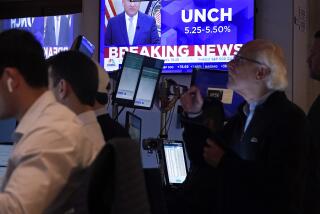Week in Review
ABC, Behind in Ratings, Overhauls Management
Walt Disney Co. replaced top management at its struggling ABC network, which has drained the companyâs bottom line and jeopardized the standing of Chief Executive Michael Eisner.
News of an overhaul was long expected -- entertainment Chairman Lloyd Braun already quietly departed his office in anticipation of a shake-up. But many were stunned by its sweep.
The most surprising casualty was ABC Entertainment President Susan Lyne, once hailed as the answer to ABCâs chronic programming problems. According to network sources, Lyne was passed over for the newly created job of president of ABC Primetime Entertainment. The position went to Stephen McPherson, who heads Disneyâs Touchstone Television studio.
Promoted as co-chairs of Disneyâs media networks unit were Anne Sweeney, who oversees the companyâs entertainment cable channels, and George Bodenheimer, president of cable juggernaut ESPN.
Disney executives declined to discuss the reasons behind the changes.
*
U.S., China Reach Accord on Piracy
U.S. and Chinese officials agreed to curtail piracy of American movies, music and computer software, reduce barriers to U.S. technology and make it easier for domestic firms to gain entry to Chinaâs markets.
Bush administration officials said the accords reflected groundbreaking concessions by both sides that would help ensure that China abided by commitments to provide a level playing field for U.S. companies doing business there.
Leaders in Hollywoodâs movie and music industries praised the agreements, which include a pledge by China to crack down on counterfeiters and curb trade in pirated materials. But some stressed it remained to be seen whether China would live up to the agreements.
The deals were finalized in discussions between a Chinese delegation headed by Vice Premier Wu Yi and a U.S. team of Commerce Secretary Don Evans, U.S. Trade Representative Robert B. Zoellick and Agriculture Secretary Ann M. Veneman.
*
Executives at Janus, JB Oxford Resign
JB Oxford Holdings Inc. and Janus Capital Group Inc., two firms under investigation for alleged mutual fund trading abuses, announced top management shake-ups that analysts said appeared aimed at appeasing regulators.
Beverly Hills-based JB Oxford said in a regulatory filing that its president and chief operating officer, James Lewis, resigned. The small discount brokerage also said the Securities and Exchange Commissionâs Los Angeles office had recommended âcivil and administrative proceedings against the companyâ after scrutinizing the unit that processes trades.
Separately, Mark Whiston stepped down as chief executive of Janus Capital, the Denver-based mutual fund company with $150 billion under management. Whiston will be succeeded by Chairman Steven Scheid.
Janus said Whistonâs departure was a mutual decision between him and the board. JB Oxford declined to comment.
Neither firm has been charged with wrongdoing.
*
Adelphia Plans Sale of Cable Operations
Adelphia Communications Corp., the nationâs fifth-largest cable TV provider, said it would put its operations up for sale because of protests that the companyâs bankruptcy reorganization plan undervalues its assets.
A sale of the company could pave the way for further consolidation locally and lead to more advanced services in Los Angeles, where Adelphia is the regionâs largest cable TV provider.
According to analysts and industry sources, front-runners for the Adelphia assets are likely to be Time Warner Inc., the second-ranked provider after Comcast Corp., and Cox Communications Inc., the No. 3 player. Neither Cox nor Time Warner would comment on Adelphia.
Adelphia has 5.4 million subscribers nationwide, including more than 1 million in Southern California neighborhoods such as Eagle Rock, Brentwood, Beverly Hills, Santa Monica, Manhattan Beach and areas of Orange County.
*
Kroger Sets Aside $116 Million for Rivals
Kroger Co., owner of the Ralphs grocery chain, has set aside $116 million to compensate two rivals under a mutual-aid pact the three companies devised in anticipation of the California supermarket strike and lockout, regulatory filings show.
The payout to Safeway Inc. and Albertsons Inc. could be $72 million to $75 million after taxes, analyst Andrew Wolf of BB&T; Capital Markets said.
Kroger said in its annual report to the Securities and Exchange Commission that the $116-million pretax figure was for its fiscal year ended Jan. 31.
Spokespeople for Safeway and Albertsons declined to comment or werenât available. The chains have said they wouldnât release details of their pact.
The plan for companies that are normally heated competitors to share money triggered a lawsuit by California Atty. Gen. Bill Lockyer, who alleges the pact violates federal antitrust laws. The chains have said it is legal.
*
Microsoft Settles With Minnesota Consumers
Microsoft Corp. continued the drive to leave its legal woes behind by agreeing to settle a class-action lawsuit filed by Minnesota customers who claimed they paid too much for the software titanâs products.
The suit was the only antitrust case against Microsoft by consumers to reach trial. The settlement cuts to seven the number of antitrust suits filed on behalf of groups of consumers pending against the company.
Terms of the final deal wonât be made public until June because some issues remain unresolved. But outside experts speculated that the arrangement was similar to those reached in 10 other states, including California, which offered millions of consumers discounts on future purchases and aided schools in poor neighborhoods.
The Minneapolis case went to trial in March in Hennepin County District Court.
*
Northrop Lied to U.S., Documents Say
Northrop Grumman Corp. lied to the Air Force to cover up problems with a radar-jamming system it was developing in the late 1980s and submitted fraudulent bills on other equipment, according to documents unsealed last week.
âWe lied our teeth offâ and ânow we need to make these lies come true,â one of the documents quotes a Northrop manager telling employees in 1985.
The documents were unsealed by a federal judge in Chicago as part of a whistle-blower lawsuit scheduled to go to trial this year. When the suit was filed 15 years ago, it appeared to focus on alleged accounting irregularities. The documents show there also are fraud accusations related to the companyâs alleged overcharging for materials and falsifying of data.
The Justice Department, representing former Northrop employees who filed the suit, says managers lied about the readiness of radar-evading technology for the companyâs B-2 stealth bomber. Filed under the False Claims Act, the suit seeks $369 million in damages.
A spokesman said Northrop was likely to file a motion to dismiss. âThe company denies these allegations and will ... vigorously defend the actions.â
*
SBC Reports Another Decline in Revenue
Telephone giant SBC Communications Inc. reported its 13th straight quarter of declining revenue as subscribers dropped lines and competition kept a lid on major price increases.
Californiaâs dominant local phone-service provider said first-quarter profit fell 61% to $1.9 billion, or 59 cents a share, from $5 billion, or 74 cents, a year earlier when there was a $2.5-billion gain from accounting changes. Sales slid 2.4% to $10.1 billion from $10.4 billion.
Excluding one-time charges, SBC earned 37 cents a share, 5 cents more than Wall Street analysts had expected.
SBC said it expected to start posting year-over-year revenue growth in the third or fourth quarter. But a spokeswoman cautioned that SBC wasnât forecasting full-year sales above last yearâs $40.8 billion.
For now, SBC Chairman Edward E. Whitacre Jr. said, the company was exceeding its targets in its major growth areas such as long-distance and digital subscriber lines, or DSL, for high-speed Internet access.
*
Amazon Swings to Profit as Sales Climb 41%
Amazon.com Inc. said it swung to a hefty first-quarter profit and raised its forecasts for 2004. The online retailer said discounts, free-shipping promotions and an expansion into new product categories helped its U.S. business make solid gains and lifted foreign sales.
Amazon, based in Seattle, earned $111 million, or 26 cents a share, far exceeding analystsâ expectations. The company had lost $10.1 million, or 3 cents a share, a year earlier. Sales were $1.53 billion, up 41%. Without the benefit of a weak dollar, revenue would have risen 33%.
With its third consecutive quarterly profit after years of losses, Amazon has begun chipping away at the massive debt it accumulated to build the worldâs largest Internet-only store and expand into international markets. But some analysts said Amazonâs results, although strong, looked somewhat mediocre compared with the profits reported this month by fellow Internet heavyweights EBay Inc. and Yahoo Inc.
More to Read
The biggest entertainment stories
Get our big stories about Hollywood, film, television, music, arts, culture and more right in your inbox as soon as they publish.
You may occasionally receive promotional content from the Los Angeles Times.










